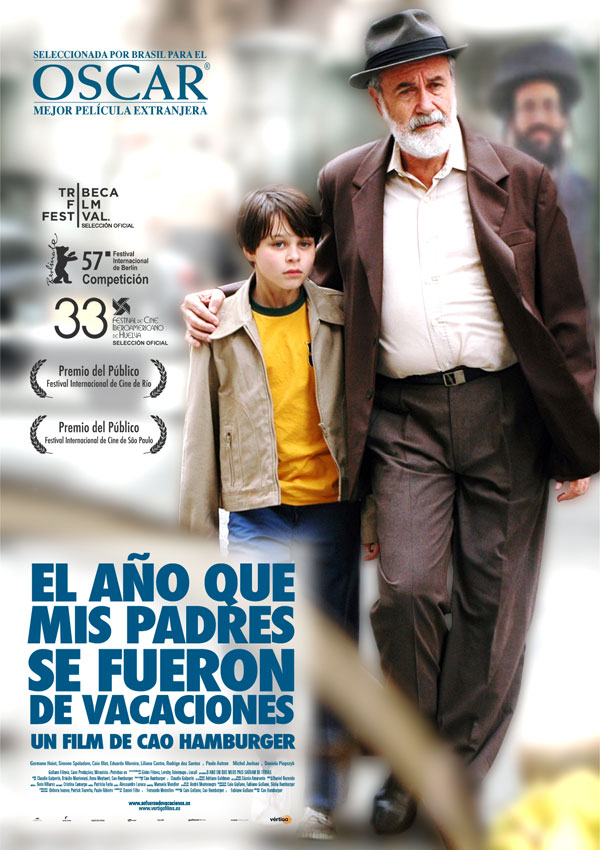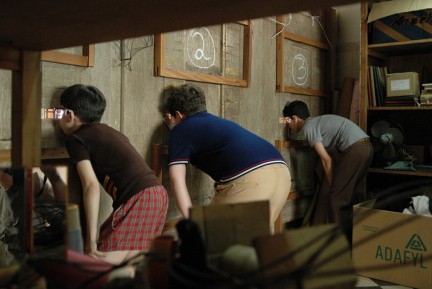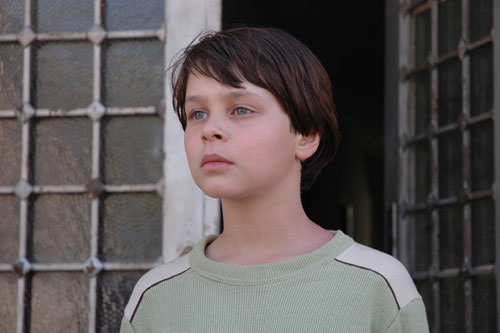Prologue of Cronipoemas "
By way of prologue
is difficult to make a selection from the poems themselves when you do not get carried away by a thematic or formal illation accurate. My intention here is to assemble parts, fragments, allusions, details, places, of different shape, size, degree of completion and around what is called "Mood", which keeps the character a bit fragmentary, mosaical , other books of mine, and I think perhaps too unitary language sometimes distort or lie. Somehow this book implicitly assumes poetry-life relationship was not, and something that is understandable in itself, no drama, or cliché onion, almost, but not excluded a priori and I think they are existing forms of expression, valid or perhaps essential, whether good or bad in a sense of cultural hierarchy axiological or institutional. This poetry-life context, which places this book, there is a tremendous new but no less celebrated, not preaching must be sick as an axiom not necessarily have an impact on the degree of complexity or simplicity of the texts offer. Maybe in my case, what is perhaps a surprise, poetry and life are closely juxtaposed, as noted by Manuel Jofre, Chilean poet and critic, who says "the relationship between literature and life is very narrow in writing Etcheverry, "although there may be also more or less irreducible elements such as the Cuban poet José Carlos Sánchez Lara poetry called residual. Then it becomes even more clear in the title of this book, Cronipoemas, which includes texts appeared on paper, for example in an anthology of poetry and prose magician Chilean editors published in Santiago, or virtual version, as "words of the great woman "which appeared on a wall and virtual exhibition in tribute to the Cultural Celebration of the English Language that made the Creative Registry of the Canadian Association of English scholars, and other texts published in Letralia, but as narrative. I did not bother no critic or poet known or friend to make me a prologue, and they are very busy in the winter in Chile that is stretched in his vest wet smog or humid tropical heat in that other country of almost diametrically opposed neurons melts us. I hope these lines unbiased reading. Jorge Etcheverry
Arcaya
July 2010. Ottawa
Friday, October 29, 2010
Monday, October 11, 2010
Jenna Jameson Streaming 2010
The absence of the Mona Lisa Bird
Nieves Fuentes
I fell asleep watching one of those cheap reproductions of the Mona Lisa.
And I dreamed that
finally tired of keeping the enigmatic smile,
she rose, left the box
and opened the door lost in the outside world. Waking
found something strange. Table
where before there was the mysterious woman only found a gap.
Amour = Love = Love!
Nieves.
October 4, 2010. 
Nieves Fuentes
I fell asleep watching one of those cheap reproductions of the Mona Lisa.
And I dreamed that
finally tired of keeping the enigmatic smile,
she rose, left the box
and opened the door lost in the outside world. Waking
found something strange. Table
where before there was the mysterious woman only found a gap.
Amour = Love = Love!
Nieves.
October 4, 2010.
Sunday, October 3, 2010
Cheat Of Pokemon Leaf Green(vba)
The Year My Parents Went on Vacation (Cao Hamburger) Brazil, 2007. Friday October 2, 2010
Trailer of the film: 
When one is introduced, say, in the family of his partner, to avoid arousing resentment that can stain first impression, you should not talk about football, religion or politics. Cao Hamburger
is forget this advice and talk about all this but softly. I conveyed through an intimate and sentimental drama in São Paulo, in 1970, when the Brazil team that won the World Cup. To do this, with a hint of nostalgia but with a bittersweet feeling, tells the story of Mauro, a twelve year old boy should spend the entire year away from their parents and with her grandfather. The political and dictatorial forces their parents to wean them their son temporarily, while fate fatal, never will cause find her grandfather. This leaves Mauro in the hands of the Jewish community it belongs to the grandfather, where he will be cared for primarily by the neighbor, an elderly gentleman, unwilling to do so, but led by the rabbi of the community, who see the situation where Mauro is in parallel with the haphazard biography of Moses.
forget this advice and talk about all this but softly. I conveyed through an intimate and sentimental drama in São Paulo, in 1970, when the Brazil team that won the World Cup. To do this, with a hint of nostalgia but with a bittersweet feeling, tells the story of Mauro, a twelve year old boy should spend the entire year away from their parents and with her grandfather. The political and dictatorial forces their parents to wean them their son temporarily, while fate fatal, never will cause find her grandfather. This leaves Mauro in the hands of the Jewish community it belongs to the grandfather, where he will be cared for primarily by the neighbor, an elderly gentleman, unwilling to do so, but led by the rabbi of the community, who see the situation where Mauro is in parallel with the haphazard biography of Moses.
If football is omnipresent through the crowd of Mauro and religion shows a custom which makes the brush we paint the canvas landscape, politics is outside the field that is imaginable and described before strange behaviors of adults or shooting situations of repression are observed by Mauro. Brazil suffered the dictatorship since 1964 pushes the edges of the fictional representation and cracking these walls to establish through allusion and metaphor index its presence in the story.
The position taken is that of a few inches off the point of view, and set it from the perspective of cognitive and perceptual Mauro, a boy of twelve years. If we put some introductory titles at the beginning of the film in the situation then we will present the viewer is intended to see things as if Mauro. One option that may remind series The Wonder Years. We think that falls into a similar sentimental nostalgia, but here, the harsh social and personal context that our hero lives minimizes the effects of homesickness mechanisms for believing that any past was always better. Football and the victory of Brazil in the Copa act as a catalyst sweetener of a decisive breakthrough year for Mauro painful. However, this endearing patina itself that keeps close connections with the film Kamchatka (2002) where Marcelo Piña showed us the dictatorship in Argentina, indirectly, from the point of view of Harry, a child ten years.
 This option does not avoid falling into the common ground of films for children: the first love ( Hanna ), awakening to sex but not the somewhat bizarre dreamlike quality of Federico Fellini's Amarcord (1973) or Léolo (Jean Claude Lauzon, 1992). Everything in this film is soft, gentle lines. And as if to establish a synecdoche to focus on a Jewish neighborhood of Sao Paulo used to use plenty of close-ups close-ups and display understanding that each part contributes to the overall perception. Similarly, the portrait of a particular community will achieves the general picture of a city or a country.
This option does not avoid falling into the common ground of films for children: the first love ( Hanna ), awakening to sex but not the somewhat bizarre dreamlike quality of Federico Fellini's Amarcord (1973) or Léolo (Jean Claude Lauzon, 1992). Everything in this film is soft, gentle lines. And as if to establish a synecdoche to focus on a Jewish neighborhood of Sao Paulo used to use plenty of close-ups close-ups and display understanding that each part contributes to the overall perception. Similarly, the portrait of a particular community will achieves the general picture of a city or a country.
There is also an effort to make a compositional work in which the figures are viewed from unexpected angles, either from the reflection of a closet, or from the same handset, establishing the presence of another person in space a sustained effort of staging. Precisely intended to symbolize the ghosts of the dictatorship, that figure gripping spectrally.
And although the sport and movies are not usually good friends here football sign appears as a country's cultural identity. Alternate scenes are repetitive celebrating Brazil's victory: the rabbi and his relatives, women or people in the bar to emphasize how football that year was a sign of cohesion and also an outlet where people reach moments of happiness a harsh environment caused by the repression and lack of freedom of expression of a dictatorial government. Mauro
in childhood is like a bubble and even feel a sense of abandonment and denotes strange behavior is not able to conceptualize exactly what is happening. Not able to discern the magnitude of the gravity of the situation. He feels helpless, but nevertheless, lives dreaming football and stick to their immediate surroundings, families caring for you, Hanna, her friends, etc. Is in some way, what happened in Life is Beautiful (Roberto Benigni, 1998) , in which the father tries to convince the child, while in the camp, that this is a game in order to preserve the innocence of childhood. Just such ingenuity is what Mauro safeguards to be aware of the serious danger to their parents. Mauro
strange behavior is not able to conceptualize exactly what is happening. Not able to discern the magnitude of the gravity of the situation. He feels helpless, but nevertheless, lives dreaming football and stick to their immediate surroundings, families caring for you, Hanna, her friends, etc. Is in some way, what happened in Life is Beautiful (Roberto Benigni, 1998) , in which the father tries to convince the child, while in the camp, that this is a game in order to preserve the innocence of childhood. Just such ingenuity is what Mauro safeguards to be aware of the serious danger to their parents. Mauro
remember what I was saying his father figure of the goalkeeper in the lineup and will be with this figure to be identified. Ni with Pele or with Tostao, the stars of the selection. And is that the goalkeeper is a different player, because while others may make mistakes, no goalkeeper. Is there only goal expecting the worst. And if his father was always late everywhere, which means it is the figure of the exiled, those who take so long, never arrived. Manu
Argüelles ( The imaginary audience ) is
 forget this advice and talk about all this but softly. I conveyed through an intimate and sentimental drama in São Paulo, in 1970, when the Brazil team that won the World Cup. To do this, with a hint of nostalgia but with a bittersweet feeling, tells the story of Mauro, a twelve year old boy should spend the entire year away from their parents and with her grandfather. The political and dictatorial forces their parents to wean them their son temporarily, while fate fatal, never will cause find her grandfather. This leaves Mauro in the hands of the Jewish community it belongs to the grandfather, where he will be cared for primarily by the neighbor, an elderly gentleman, unwilling to do so, but led by the rabbi of the community, who see the situation where Mauro is in parallel with the haphazard biography of Moses.
forget this advice and talk about all this but softly. I conveyed through an intimate and sentimental drama in São Paulo, in 1970, when the Brazil team that won the World Cup. To do this, with a hint of nostalgia but with a bittersweet feeling, tells the story of Mauro, a twelve year old boy should spend the entire year away from their parents and with her grandfather. The political and dictatorial forces their parents to wean them their son temporarily, while fate fatal, never will cause find her grandfather. This leaves Mauro in the hands of the Jewish community it belongs to the grandfather, where he will be cared for primarily by the neighbor, an elderly gentleman, unwilling to do so, but led by the rabbi of the community, who see the situation where Mauro is in parallel with the haphazard biography of Moses. If football is omnipresent through the crowd of Mauro and religion shows a custom which makes the brush we paint the canvas landscape, politics is outside the field that is imaginable and described before strange behaviors of adults or shooting situations of repression are observed by Mauro. Brazil suffered the dictatorship since 1964 pushes the edges of the fictional representation and cracking these walls to establish through allusion and metaphor index its presence in the story.
The position taken is that of a few inches off the point of view, and set it from the perspective of cognitive and perceptual Mauro, a boy of twelve years. If we put some introductory titles at the beginning of the film in the situation then we will present the viewer is intended to see things as if Mauro. One option that may remind series The Wonder Years. We think that falls into a similar sentimental nostalgia, but here, the harsh social and personal context that our hero lives minimizes the effects of homesickness mechanisms for believing that any past was always better. Football and the victory of Brazil in the Copa act as a catalyst sweetener of a decisive breakthrough year for Mauro painful. However, this endearing patina itself that keeps close connections with the film Kamchatka (2002) where Marcelo Piña showed us the dictatorship in Argentina, indirectly, from the point of view of Harry, a child ten years.
 This option does not avoid falling into the common ground of films for children: the first love ( Hanna ), awakening to sex but not the somewhat bizarre dreamlike quality of Federico Fellini's Amarcord (1973) or Léolo (Jean Claude Lauzon, 1992). Everything in this film is soft, gentle lines. And as if to establish a synecdoche to focus on a Jewish neighborhood of Sao Paulo used to use plenty of close-ups close-ups and display understanding that each part contributes to the overall perception. Similarly, the portrait of a particular community will achieves the general picture of a city or a country.
This option does not avoid falling into the common ground of films for children: the first love ( Hanna ), awakening to sex but not the somewhat bizarre dreamlike quality of Federico Fellini's Amarcord (1973) or Léolo (Jean Claude Lauzon, 1992). Everything in this film is soft, gentle lines. And as if to establish a synecdoche to focus on a Jewish neighborhood of Sao Paulo used to use plenty of close-ups close-ups and display understanding that each part contributes to the overall perception. Similarly, the portrait of a particular community will achieves the general picture of a city or a country. There is also an effort to make a compositional work in which the figures are viewed from unexpected angles, either from the reflection of a closet, or from the same handset, establishing the presence of another person in space a sustained effort of staging. Precisely intended to symbolize the ghosts of the dictatorship, that figure gripping spectrally.
And although the sport and movies are not usually good friends here football sign appears as a country's cultural identity. Alternate scenes are repetitive celebrating Brazil's victory: the rabbi and his relatives, women or people in the bar to emphasize how football that year was a sign of cohesion and also an outlet where people reach moments of happiness a harsh environment caused by the repression and lack of freedom of expression of a dictatorial government. Mauro
in childhood is like a bubble and even feel a sense of abandonment and denotes
 strange behavior is not able to conceptualize exactly what is happening. Not able to discern the magnitude of the gravity of the situation. He feels helpless, but nevertheless, lives dreaming football and stick to their immediate surroundings, families caring for you, Hanna, her friends, etc. Is in some way, what happened in Life is Beautiful (Roberto Benigni, 1998) , in which the father tries to convince the child, while in the camp, that this is a game in order to preserve the innocence of childhood. Just such ingenuity is what Mauro safeguards to be aware of the serious danger to their parents. Mauro
strange behavior is not able to conceptualize exactly what is happening. Not able to discern the magnitude of the gravity of the situation. He feels helpless, but nevertheless, lives dreaming football and stick to their immediate surroundings, families caring for you, Hanna, her friends, etc. Is in some way, what happened in Life is Beautiful (Roberto Benigni, 1998) , in which the father tries to convince the child, while in the camp, that this is a game in order to preserve the innocence of childhood. Just such ingenuity is what Mauro safeguards to be aware of the serious danger to their parents. Mauro remember what I was saying his father figure of the goalkeeper in the lineup and will be with this figure to be identified. Ni with Pele or with Tostao, the stars of the selection. And is that the goalkeeper is a different player, because while others may make mistakes, no goalkeeper. Is there only goal expecting the worst. And if his father was always late everywhere, which means it is the figure of the exiled, those who take so long, never arrived. Manu
Trailer of the film:
Subscribe to:
Posts (Atom)